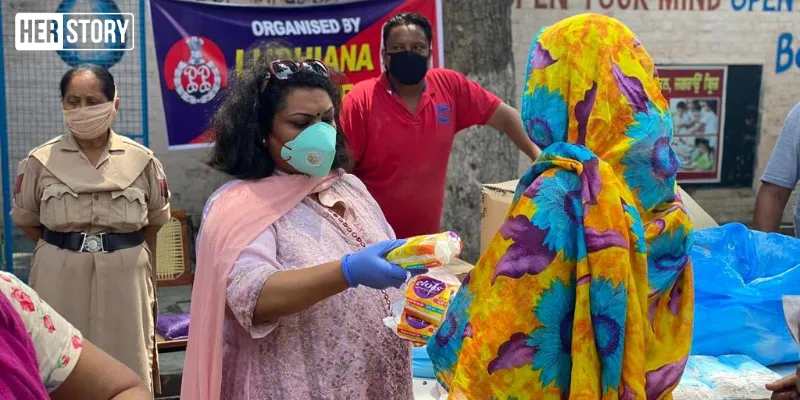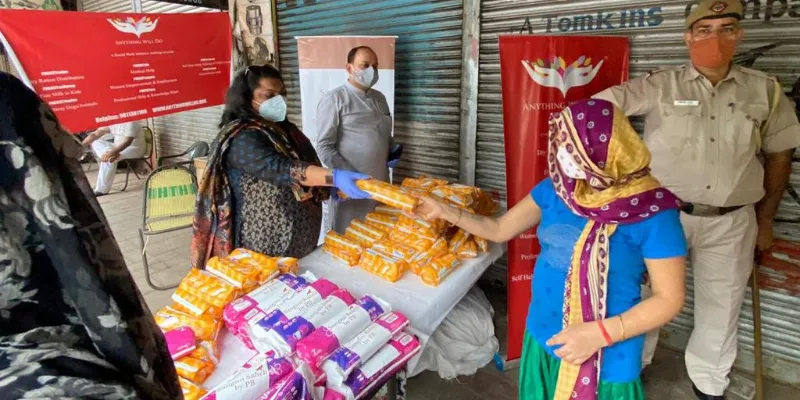This IRS officer has distributed over 11 lakh pads across 17 states and initiated conversations on menstrual hygiene
IRS officer Aman Preet, Joint Commissioner of Income Tax, Delhi has commanded a large operation that has reached sanitary pads to prisons, sex workers, remote villages and even people affected by cyclone Amphan in remote areas of Sunderbans.
Indian Revenue Services (IRS) officer Aman Preet has distributed over 11 lakh pads to women across 17 states during the lockdown announced following the coronavirus. The Delhi based bureaucrat was inspired to start this initiative by her friend Priyal Bhardwaj who had used her own savings to buy pads and distribute it to women in underprivileged areas in Noida.
Fifteen days into the lockdown, Priyal, a fashion designer, who was distributing the pads under the Sangini Saheli Trust asked Aman Preet to join her to distribute napkins to women working in brick kilns in Noida.

IRS officer Aman Preet distributing pads in Ludhiana, Punjab. (Image source: Aman Preet)
Priyal’s interaction with the women there turned out to be the impetus for Aman Preet to increase the distribution of sanitary pads and initiate larger conversations on menstrual health and hygiene.
“It was a shocker to note that they were the breadwinners but were not able to buy pads for themselves,” says Aman Preet.
When Aman Preet asked the women why they weren’t using pads, their answer stumped her. They said, “Hamari toh saari umar hi kapda use karne me nikal gayi aur joh hamare ghar ke bade log hai na hume woh permission nahi dete hain” (Our whole life, we have used cloth and even if we want to use pads, elders in our family don’t allow us). They also said that instead of spending Rs 20 to buy pads, they could rather buy other essentials for their families.
From remote areas, to prisons, sex workers, and Sunderbans
During her visit along with Priyal, Aman Preet realised that more than 50 percent of the women did not use sanitary napkins. Social taboos and ignorance led them to suffer an unhealthy menstrual hygiene routine.
She joined hands with Priyal and with her vast network of IRS batchmates, friends and good samaritans managed to distribute pads and organise menstrual awareness camps even during the lockdown.
An officer of the 2010 IRS batch, Aman Preet used a WhatsApp group to reach out to fellow batchmates to carry out distribution in their respective areas and monetary assistance poured in. Her friends and family also chipped in to help.
Soon, the pads were distributed in Bhopal, Palwal, Sangrur and more places. In Sangrur, a remote village in Punjab, her friend distributed 20,000 pads on World Menstrual Hygiene Day, May 28 with the help of gurudwaras and clubs.
In Bengal, after cyclone Amphan struck, Aman Preet sought help from the IRS association and the Income Tax Sports and Recreational Club to reach out to people affected by the disaster. Two of her batchmates Atul Pandey and Nivedita Prasad went to remote islands in Sunderbans to distribute rations and sanitary napkins after the cyclone.
In Jammu, an Urdu teacher, who got in touch with her on Facebook along with his friends and brother-in-law who was working at a COVID sample collection unit teamed up with women at a district healthcare centre to distribute pads in remote areas like Doda district and villages with less than 100 people.
After the success of this unit, Aman Preet decided that the initiative must reach out to remote areas, containment zones and places untouched by NGOs.

Aman Preet distributing pads in GB Nagar, Delhi during the lockdown. (Image source: Aman Preet)
In Punjab, while she organised camps to distribute the pads along with ration, masks and hygiene kits, it struck her that prisons might also be facing a shortage.
“Agar pads nahi pohach rahe hein toh kisika dhyan bhi nahi gaya hoga (If pads are not available in prisons, no one would have noticed also),” she says. What she feared was indeed true. Prisons were also facing a shortage of sanitary pads.
Using her late mother’s contacts in the prison department, she managed to distribute pads in all 20 women’s prisons in Punjab and 14 prisons in Arunachal Pradesh.
In Delhi, she distributed pads and ration to sex workers in GB nagar and to people devastated by the massive fire in Tughlakabad area in late May.
Various Rotary Clubs, police departments joined in her efforts to provide supplies and recently Walmart joined the initiative to distribute pads to remote areas like Beed in Maharashtra and Gird in Jharkhand.
Fighting age-old taboos
While distributing pads, Aman Preet met old women who promised to take the pads to their daughters and daughters-in-law. However, there was also resistance from some people.
“You'll be surprised to know that challenges came from people to whom we wanted to give sanitary napkins. Those women were not mentally prepared,” Aman Preet says.
When they sent the pads to a village in Rajasthan, someone had put the sanitary napkins along with the ration packets and people threw the ration away saying that “yeh ganda kar diya, hum nahi lenge usko” (this has become bad, we will not take it). In Johri village, where she received support from the ‘shooter dadis’ Chandro and Prakashi Tomar (on whom the movie Saand Ki Aankh is based), people asked to distribute masks and rations instead of napkins. The same sentiment was expressed by people in Dausa, Rajasthan.
She was also alarmed by the different unhealthy practices that women adopted during periods. Some told her that they used ash on their cloth pads to absorb the blood. Some girls started using cloth during the lockdown because they couldn’t ask others to buy pads for them.
Then Aman Preet started organising camps, and brought in doctors to educate people on menstrual hygiene and make them understand that it is not an unhealthy thing and an essential commodity.

Along with sanitary napkins Aman Preet also organised menstrual hygiene workshops. (Image source: Aman Preet)
In some places where women were shying away from taking a pad from distributors, they would just keep the carton of pads and urged women to come and take it. Seeing people look for newspapers to cover the pad, some hiding it in their clothes made Aman Preet realise that taboos were still attached to menstruation.
She heard experiences from several women and girls on how they would save up pocket money to buy pads, not tell their mothers or keep their menstruation a secret from their family members, apply chalk on their school skirts if they stained themselves and wait for the school to empty out so that they could leave too and more such stories.
Aman Preet believes education and awareness will only help in doing away with this kind of taboos and initiating conversations around menstruations is imperative for good health and hygiene in the long run.
Edited by Rekha Balakrishnan









